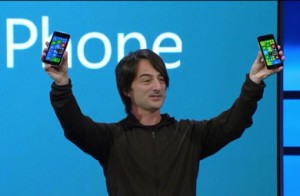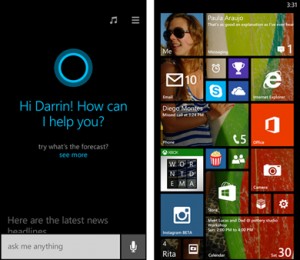The Siri competitor comes with most personal smartphone assistant of all
On Wednesday, 2nd April Microsoft kicked off its Build conference by officially unveiling the first major update to its flagship smartphone platform.
Windows Phone 8.1 will be released to current Windows Phone 8 users as a download update “in the next few months,” announced Joe Belfiore, corporate vice president of Microsoft’s Operating Systems Group, during the Day 1 keynote presentation held in San Francisco’s Moscone Center. That indicates a somewhat delayed release from the “spring” timeframe that Microsoft laid out in February at Mobile World Congress (MWC).
New devices running Windows Phone 8.1 will be available “as soon as very late April or early May,” Belfiore said. Windows Phone 8.1 will support a

wider range of devices from a larger pool of hardware partners, he noted. He announced two new Windows Phone hardware partners, India-based Micromax and Cyprus-based Prestigio, in addition to the nine new OEMs Microsoft announced at MWC.
The highlight of Belfiore’s keynote was his demo of Cortana, an interactive “personal assistant” feature that’s new to Windows Phone 8.1 and is similar to the Apple iPhone’s Siri. Confirming earlier reports, Cortana essentially replaces Windows Phone’s old Bing search function. Cortana responds to a user’s voice queries, as well as interacts with speech-enabled third-party apps like Skype and Hulu. It also responds to typed queries.
Belfiore emphasized the “personal” aspect of Cortana: “The more I use the search function, the more Cortana learns about me,” he noted. Cortana tracks Windows Phone usage habits to infer things like a user’s interests, popular contacts, frequently visited places and quiet hours. Users can also let Cortana access their e-mails. Cortana then collects this information in a “notebook” and uses it to make suggestions, give reminders or provide a more personalized context to its answers.
Users are able to modify what is in Cortana’s notebook, which provides “a transparent way of letting the user control their relationship with Cortana,” Belfiore said.
In a nod to the handful of snags in his demo in which Cortana misheard what he asked it, Belfiore said that Cortana will initially launch in beta as Microsoft makes improvements to its speech recognition capabilities.
Other Windows Phone 8.1 improvements are aimed at “making Windows Phone more personal,” according to Belfiore. A new, customizable Action Center can be accessed by dragging down from the top of the screen, and provides a quick view of app notifications and access to quick-launch app buttons. Microsoft has also added options to customize the lock screen and start screen with different backgrounds and layouts.

For enterprises, Windows Phone 8.1 will have support for VPN and S/MIME. It is also designed to adapt to and comply with an organization’s mobile device management policies. Windows Phone 8.1 provides a common security experience for IT across a range of devices, according to Nick Hedderman, Microsoft global product marketing manager, who joined Belfiore onstage to discuss the enterprise improvements.
“Windows Phone 8.1 is now killer for businesses,” Belfiore said.
Other improvements demonstrated during the keynote include:
- A new Wi-Fi Sense feature that makes it easier for users to automatically connect to public Wi-Fi networks, as well as control how others connect to their private home network. It also shares Wi-Fi settings with a user’s PC and vice versa.
- Navigation enhancements to the Windows app store.
- Improvements to the calendar, including new view options and the ability to simply swipe to the next day.
- The ability to easily switch from a regular voice call to a video call via Skype or another third-party app.
- An improved Word Flow Keyboard that lets users quickly swipe from key to key, rather than tapping each letter.






